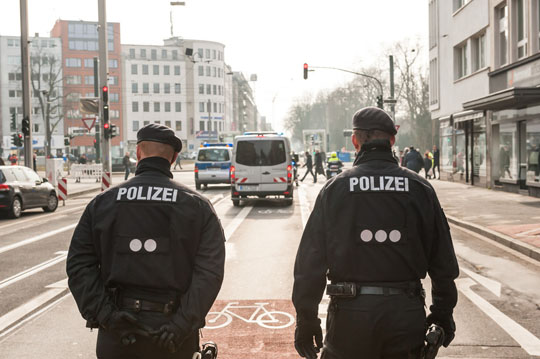Forecasts for the Police
Freiburg, May 15, 2017
It sounds like a science fiction novel. "Predictive Policing" (PP) uses mathematical-statistical methods to calculate probabilities that predict in which locations crimes are likely to be committed. A sociologist at the Center for Security and Society of the University of Freiburg is researching the use of such technologies in preventive policing. Petra Völzing spoke with him about the efficacy of algorithm-based methods and the possible societal consequences of their use.
 The software uses police data bank data on break-ins to calculate the probability of burglaries in a specific time period and part of the city.Photo: Lothar Drechsel/Fotolia
The software uses police data bank data on break-ins to calculate the probability of burglaries in a specific time period and part of the city.Photo: Lothar Drechsel/Fotolia
Mr. Hälterlein, why is it that "predictive policing" (PP) as a topic is so present in the media at the moment?
Jens Hälterlein: First of all, many of Germany's federal states have decided to test PP. Bavaria is a pioneer in this respect and is already using the method in Nuremberg and Munich. Society really feels unsafe and that puts pressure on politicians and police to act. They can then say, "Look, we're doing something." The presumed similarity to science fiction, as shown for example in the film "Minority Report," certainly makes it interesting for the media. In the film, beings known as "Precogs" predict murders that the police can then prevent based on that information. Yet up to now, predictive policing has had nothing at all indeed to do with artificial intelligence. It is a purely statistical, mathematical process.
How does predictive policing work?
Criminological theories provide the basis for it. Take, for example, the Near Repeat Theory, which says that professional break-ins are always close to one another in terms of time and space. The focus of PP at the moment is on crimes involving breaking-and-entering. The software uses data on break-ins from police data banks. On this basis, the program calculates for a limited area, a city district for example, and for a relatively short period of time, how great the probability is that break-ins will take place in certain areas. The results are then shown on a map.
What do the police do with this information?
They can plan how to use their resources. In areas that are "at risk," they can deploy additional patrols. The goal is to deter criminals or catch them in the act, which actually doesn't happen very often. But you must see, however, that in other places, there's less police presence, because the resources are, after all, limited.
Is the procedure successful?
The state criminal investigation offices have done evaluations that show positive effects. It is a bit questionable, however, when the user is actually evaluating the product themselves. External, scientific studies with resilient data haven't been done at this point. The Max Planck Institute for Foreign and International Criminal Law in Freiburg is working on a study on the use of the method in Karlsruhe and Stuttgart. It will soon be published. But even if burglary rates fall, one can only at most assume, but not know, that PP played a role in this. Reality is very complex. There are many factors that have an influence which ultimately do not lead to a causal statement such as "PP led to a clear reduction in crime."
Does that mean that predictive policing is therefore an expensive, pointless exercise?
I think that the hype about PP has a political aspect to it. Affluent members of society are more likely to be affected by burglary and they have more political influence. The software could ensure that the police are now even more focused on these kinds of offenses. Preventing domestic violence, for example, doesn't have a lobby of this kind. The police unions have long been calling for the employment of more officers rather than simply buying expensive software.
Scenarios like the one in the movie "Minority Report" may be an exaggeration, but doesn't the use of the software pose the threat of eroding data protection and personality rights?
In the US, where PP has already been in use for some time, there are programs that use social media data to calculate which specific person is likely to become the victim of or commit a violent crime. That's very controversial. The local method is limited to data about place, time and type of break-in, so I don't think really that's the case here. Nevertheless, there's no guarantee that the deployment of PP in Germany will remain limited to analyzing the locations of burglaries and break-ins. Predictive technologies are also being used in this country in other areas, and they rely on personal data, for example, if it's a matter of identifying someone who could possibly be a terrorist.
Do you think these technologies will be of use in the future?
Until now, there's been no clear scientific proof of benefits, but there are many well founded reservations about it. In my estimation, the technology is overrated. When you look at the facts, the effectiveness that's being attributed to it is just a myth. That's true, by the way, for other predictive technologies about which some maintain they could predict future societal developments. Google, for example, claimed that it could, predict how flu would spread on the basis of social media data. That didn't work at all.
Center for Security and Society
 These predictive technologies are overrated – up to now, there haven't been any clear, scientific studies of their efficacy, says Jens Hälterlein.
These predictive technologies are overrated – up to now, there haven't been any clear, scientific studies of their efficacy, says Jens Hälterlein.
Photo: Jens Hälterlein

